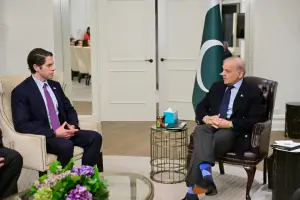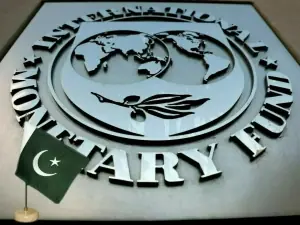IMF raises concerns over Pakistan’s strategy for declining electricity demand due to solarisation
5 min readThe International Monetary Fund (IMF) expressed concerns regarding Pakistan’s approach to tackling the challenges posed by a decline in electricity demand, largely due to the rise in solar panel usage and an oversupply of imported gas amid weakened economic conditions on Monday.
These concerns were raised during the initial discussions aimed at safeguarding the $7 billion bailout, where the IMF sought clarity on how Pakistan plans to manage the issues related to solar energy and surplus gas supplies, according to insiders familiar with the talks.
Pakistan proposed to the IMF the continuation of in-house power generation for industries using imported gas beyond January 2025, provided the costs are fully recovered. However, the IMF’s response to this proposal was lukewarm.
The Pakistani government has pledged to reduce gas supplies starting in January and to transition industries to the national grid, a move that has frustrated industrialists facing rising operational costs.
The discussions also touched on over Rs400 billion in unrecovered dues related to the Gas Infrastructure Development Cess, with the government contending that court stay orders have hindered recovery efforts.
Key officials in the talks included Pakistan’s Minister for Power Sardar Awais Laghari, Minister of State for Finance Ali Pervaiz Malik, and various secretaries from finance, power, and petroleum, along with the chairman of the Federal Board of Revenue.
The IMF team, led by mission chief Nathan Porter, arrived for a week-long review of the implementation of the recently approved three-year bailout package.
Sources indicated that the IMF highlighted the declining electricity demand due to the increasing adoption of rooftop solar panels, which serve as a more affordable alternative to expensive grid electricity. They also inquired about the Punjab government’s incentives for solar energy, which conflict with federal policies.
However, the IMF did not receive satisfactory answers regarding solar energy usage and urged the energy ministry to take initiative on the matter.
During talks in May of the previous year, Pakistan had informed the IMF of plans to end the net metering policy for rooftop solar installations in favor of gross metering, which would allow the sale of costly grid electricity to consumers.
As electricity costs have soared, many middle and upper-class households are increasingly turning to solar power. Electricity prices have more than doubled in the past two years, with residential consumers now paying as much as Rs70 per unit. This shift to solar has led to a notable decrease in electricity demand, with power generation in September falling 10% below projections and an 8% drop in demand during the first quarter of the current fiscal year.
Winter electricity package
The IMF sought information on how Prime Minister Shehbaz Sharif’s winter electricity package would affect overall electricity demand, but sources indicated that no clear answers were given.
Last week, Prime Minister Sharif announced reduced electricity rates for residential, commercial, and industrial consumers based on incremental usage from December to February to encourage power consumption, which has been declining. Currently, base rates for domestic users range from Rs37.49 to Rs52.07 per unit. Under the new package, additional usage will be charged at Rs26.07 per unit, translating to savings of 30-50% compared to existing rates.
The IMF expressed satisfaction with the implementation of the circular debt management plan in the first quarter of the fiscal year, noting that the government successfully reduced the flow of circular debt and improved bill recoveries to around 91%. However, this increase was largely due to higher electricity tariffs and delays in implementing the fourth quarterly tariff adjustments.
The IMF reiterated that the government should provide targeted electricity subsidies only to beneficiaries of the Benazir Income Support Programme (BISP). However, the Power Division raised concerns about legal issues in implementing this, as many electricity meters are not registered in the names of the occupants.
Gas
The discussion on Monday also addressed the issue of approximately 1000 mmcfd of surplus imported gas and Pakistan’s obligation to disconnect gas supplies to in-house power generation for industries by January 2025, as stipulated by the IMF. This requirement has sparked significant discontent within the industry due to its potential negative impact on operational costs.
Pakistan proposed that industries be allowed to utilize imported gas on a full-cost recovery basis. Currently, the government charges about Rs2,950 per MMBtu for imported gas used in captive power plants, which is approximately Rs700 below the market price. Charging full prices appears to be a practical solution and a way to address the surplus gas issue.
The IMF inquired about Pakistan’s strategy for managing the surplus imported gas resulting from low demand in the power sector. Pakistani officials indicated a desire to allocate some of this gas to industries at full price.
Additionally, Pakistan is negotiating with Qatar to defer scheduled LNG shipments for 2025 and 2026 for two years due to reduced gas consumption. Under two government-to-government agreements, Pakistan can defer up to five cargoes, but the remaining 13 shipments do not have a similar deferral option.
Read more
How capacity charges make you pay for electricity yoU never use
Gas Infrastructure Development Cess (GIDC)
The government provided the IMF with an update on the circular debt situation in the gas sector, highlighting the issue of over Rs400 billion in pending Gas Infrastructure Development Cess (GIDC) dues. The government claimed there were legal hurdles in recovering these dues due to court stay orders.
However, in 2020, the Supreme Court of Pakistan dismissed all petitions against the GIDC levy, ruling that the federal government could collect the outstanding dues. The court stated that the government was restrained from charging the cess until these dues were fully collected.
Moreover, the court ruled that during the financial year 2020-21, the Oil and Gas Regulatory Authority (Ogra) should not consider the cess when determining the sale price of CNG.
Despite the lack of legal barriers, the federal government has struggled to collect dues from fertilizer and textile companies. High courts have also instructed the government to reconcile these outstanding amounts. In the last fiscal year, only Rs2.9 billion was recovered from the over Rs400 billion owed.
According to an assessment by Topline Securities in 2020, the largest cash outflow would come from fertilizer companies, totaling Rs110 billion. Fauji Fertiliser (FFC) is liable for Rs63 billion, followed by Fauji Fertilizer Bin Qasim at Rs22 billion.
For the latest news, follow us on Twitter @Aaj_Urdu. We are also on Facebook, Instagram and YouTube.

























Comments are closed on this story.